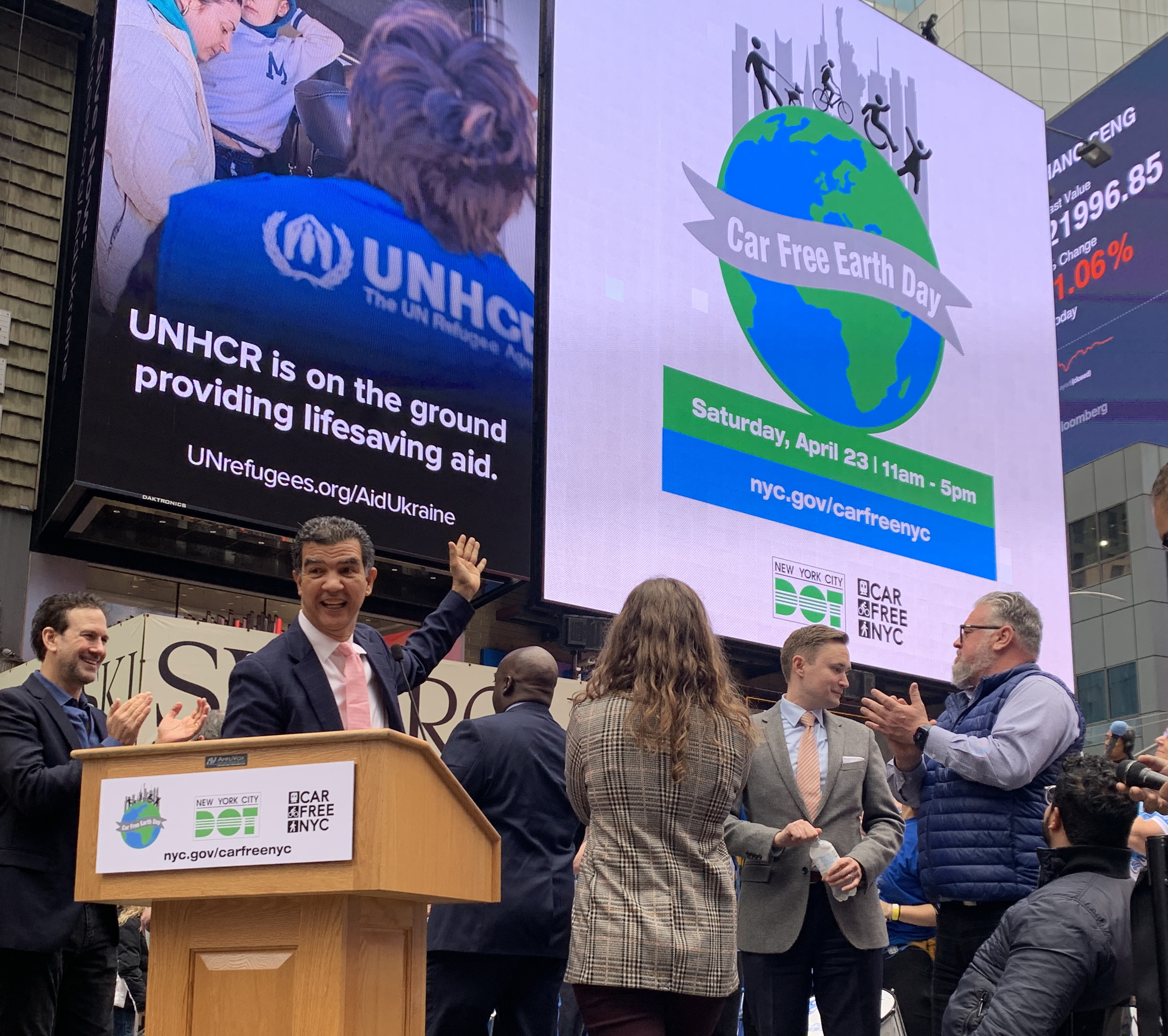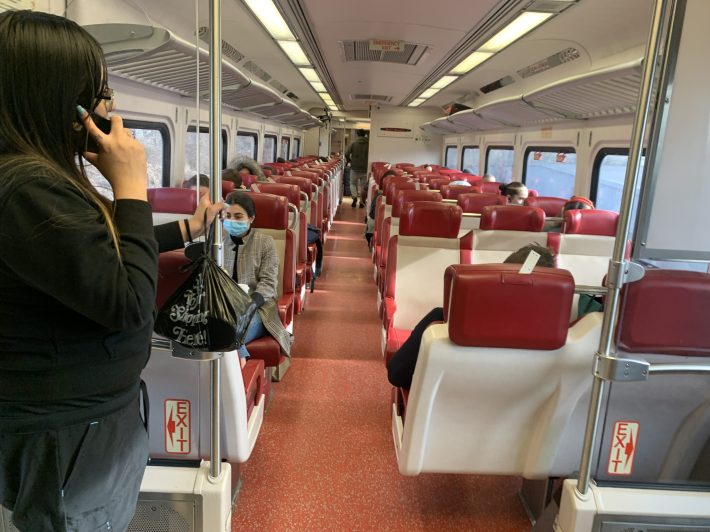Car-Free Earth Day is anything but.
On Thursday, Department of Transportation Commissioner Ydanis Rodriguez heralded the city’s big climate event: a so-called “Car Free Earth Day” on Saturday, April 23. Problem is, it’s not car-free at all. It’s merely a press release listing 3.8 miles of city streets — most of them already part of the car-light open streets program — where car drivers can’t go for a few hours on one day. (The list is at the bottom of this post.)
I had journeyed to Rodriguez’s Times Square presser under the misguided optimism that he was going to make a bold announcement — the words “Car Free Earth Day” from the media advisory was ringing through my mind like a church bell — only to find that “Car Free Earth Day” isn’t even as ambitious as the current open streets program, which itself has languished from its original, limited, ambitions due to car-owner backlash, waning volunteer efforts and lack of city support.
Yet for some reason, I thought the myriad crises — climate, congestion, carnage, and the continued consumption of fuel following decades of increasing cars sizes — would encourage government to act, not merely issue action-free statements of solidarity with the planet like corporations did after the murder of George Floyd to disassociate themselves from centuries of racism without actually having to do the work to heal the problem.
I thought of what the Netherlands did during the early 1970s, when war in the Middle East caused gas prices to increase. Then, as now, residents of this planet looked into the maw of the future and demanded change. In Holland, the government provided it — in the form of a mandated “car-free Sundays” program that eliminated all driving (except for emergency vehicles and the like), and the result was a fundamental change in the way the Dutch got around. No, they didn’t eliminate the car entirely — most Dutch families still own one — but “car free Sundays” showed residents how easy it is to replace so many silly little car trips on foot or on bikes. And then, such trips decreased. It’s not rocket science.
“The 1973 ‘Car Free Sundays’ changed something in the Dutch mindset,” a Dutch blog wrote at the 40th anniversary in 2013. “Not only did they show once again what cities looked like without cars, they also made it possible that other forms of transportation, less oil dependent and in particular cycling, were seen as a viable option for everyday transportation. This line of thinking would ultimately change the Dutch transportation system into what we have today.”
And lest we think that everything looks better on sticky Kodachrome in old photo albums, even contemporary coverage of the Dutch car-free Sundays was laudatory. A reporter for the Guardian praised what he saw on the streets (believe it or not, it even breaks through the British condescension), “At the busy crossroads…, the sound of bicycle bells and rusty – and not so rusty – wheels purring almost delicately took the place of angry drivers blowing their horns and impatiently revving their engines.”
The Dutch look fondly back at their shared sacrifice during a crisis, but no American politician even tries to evoke the spirit of us all being “in this” together — in fact, New York pols, like their cowardly counterparts in dozens of other states, are considering a gas tax holiday, an idea that not only benefits the wealthy at the expense of transit users, but accommodates America’s decades of petrol prolifigacy. Instead of saying, “We need you to drive less,” our leaders are instead saying, “We’ll help you drive because you need to drive.” It’s the ultimate echo chamber — America’s car dependence is its own self-fulfilling prophesy.
Rodriguez says he wants to break that cycle, at least in New York City.
“We are committed to doing our part to save our planet,” he said. “We encourage all New Yorkers to embrace the streets and imagine what could be possible if we open our streets for more than just moving personal vehicles. We know that the future of New York City depends on alternative forms of transportation: buses, trains, bicycles, ferries and walking in our street. … Car free day is our chance to envision a more sustainable world for more than just one day.”
So I asked Rodriguez straight out how he can stand there and present a “Car Free Earth Day” program where the only word that’s accurate is “car”:
We’re in the middle of a oil crisis, a climate crisis, a congestion crisis, a pedestrian safety crisis, yet other countries during just one of those crises — the oil crisis of the 1970s — banned driving in all cities on all streets every Sunday, which people say now [created] such a strong bike culture in the Netherlands. So doesn’t “Car Free Earth Day” pale by comparison?
Rodriguez encouraged me to be patient.
“We’re getting, we’re getting there together as a DOT,” he said. He mentioned existing programs that have created open streets, public plazas, open restaurants and Citi Bike, but he didn’t say how small they are, or how much congestion there is, and how much road death continues.
“I know the challenge and the accountability, but I feel that there’s a lot that we can celebrate,” he said.
No, you don’t to celebrate until you win. And we’re not even on the field. If can’t even ban cars from more than 3.8 miles of streets for a few hours on a single Saturday, how are we going to tackle the hard decisions ahead? How will our leaders get the public support they’ll need to make massive investments in transit, decarbonize our agriculture, clean the grid, and reduce our reliance on cars when it’s so easy to drive to grandma in the Ford Exploder.
(Speaking of grandma, on Sunday, my girlfriend wanted to visit my parents in Connecticut, so we did what non-car owners do in this country: we woke at 5:30 a.m., caught the subway, made the 8:02 from Grand Central, sat on the train for two hours, then walked 40 minutes on a dangerous narrow country road. And then, after a three-hour visit, we did the whole trip backwards. The cost was hours of frustration and discomfort — and close to $90. A car would have been cheaper and more comfortable. But it’s bad for the planet and for my neighbors.)
Perhaps “Free Transit Sundays” is a good place to start weaning Americans off their cars?
It’s no wonder that humanity won’t survive the Anthropocene age: We and our elected officials couldn’t be bothered to even do the least we could do.
Gersh Kuntzman is the editor of Streetsblog. When he gets angry, he writes a Cycle of Rage column, all of which are archived here.
Oh, and here are those “Car-Free Earth Day” locations:
Manhattan
Avenue B between East Sixth and East 14th streets (2,039 ft.)
Broadway between East 17th and West 42nd streets (6,917 ft.)
St. Nicholas Avenue between 181st and 190th streets (2,318 ft.)
The Bronx
Mosholu Parkway between Van Cortlandt Avenue East and Bainbridge Avenue (1,524 ft.)
Brooklyn
Tompkins Avenue between Gates Avenue and Halsey Street (1,500 ft.)
Queens
34th Avenue between 69th Street and Junction Boulevard (6,811 ft.)
Staten Island
Minthorne Street between Bay Street and Victory Boulevard (524 ft.)







